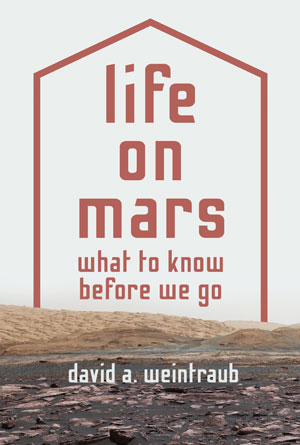
Life on Mars is about both the astronomers who have made claims about the existence of past or present life on Mars and about those discoveries themselves. It is about exactly how much we know about possible life on Mars and how certain we are about what we think we know.
Life on Mars is also about two more things. First, some important ethical and moral issues arise should we contemplate the possible human colonization of Mars in the near future. Would our views regarding human colonization of Mars change if we knew the red planet were already home to a native biology? Second, how should big science, in particular space exploration and planetary science, be done when under the intense scrutiny of the national and international media? NASA just launched the TESS mission (to find planets around nearby stars) and the InSight mission (to study Mars). Through their tax dollars, Life on Mars readers together are paying billions of dollars to fund these missions, and therefore all discoveries made via these and similar missions are and should be public knowledge. As a result, the tax-paying public quite justifiably wants to know what scientists discover. And they want to know now, not in three years when scientists and the public have moved on to the next big thing.
For more than a century, feedback between some media-savvy scientists who depend on public money to support their projects and friendly reporters has created a Mars mania. That mania may have led both scientists and the lay public to expect more of Mars than Mars may have to offer. At times, under the heat of television lights and the pressure from real-time interviewers, the mania has led eager scientists to speculate and draw profound conclusions from their research that might be true but which also might lie beyond the limits of their data and their actual knowledge. In calmer circumstances, for example on the pages of carefully written papers in refereed, scientific journals, they often have drawn different, or more nuanced, conclusions. By knowing more about Mars, readers will become wiser consumers of new discoveries that will be reported about Mars.
I think this book is unusual in that it does more than discuss the science and the scientists involved in studying Mars. Teasing apart the real Mars from an imagined Mars is difficult. I am, at heart, a teacher and so my intent is to help readers with this, but I also ask my readers to think about the issues and make their own judgments.
My readers should prepare to go on a journey with me to telescopes on high mountains scattered around the surface of Earth, to telescopes in Earth orbit and in Mars orbit, and even down to the surface of Mars. When our journey is finished, readers will have become knowledgeable about Mars. I hope they also will have become curious to know more about Mars. In fact, readers should demand that NASA, ESA, and the astronomy community continue to dedicate significant resources to learning more about Mars. The answers we hope to obtain are simply too important to not pursue.
Life on Mars is a history book that is about the future. Mars is in our future, probably the very near future. What we already know and what we likely will learn in the coming decades about life on Mars should determine how we proceed in our attempts to launch rockets and send astronauts to Mars. In real terms, we may invest hundreds of billions of dollars in the next century in our attempts to colonize Mars. Therefore, understanding Mars is important.
Like so many others, I have always been fascinated by the idea that life could exist in the universe beyond the Earth. Does it? That’s a big question. As a child of the space age, my young mind was stimulated by our exploration of the Moon and then the nearest planets in the solar system. From Mercury to Gemini to Apollo, from Ranger to Pioneer to Mariner to Viking to Voyager, I travelled the solar system with astronauts and unmanned explorers. My teenage mind was drawn into deep space by Arthur C. Clarke (The Star), Ray Bradbury (The Martian Chronicles), Isaac Asimov (The Foundation Trilogy) and Frank Herbert (Dune). Then I discovered the world of professional astronomy, in which I have immersed myself and made my own discoveries about the processes through which planets form around other stars. Finally, I came full circle: in teaching, my students helped me rediscover the deep passion for knowledge about the universe that lies beneath the big questions they ask in my classes. One of the biggest of these, repeated to me year after year for the better part of three decades, has been ‘Does life exist on Mars?’ This book is my attempt to make myself whole by writing my own chronicle of Mars, by telling a story about Mars and about those who study Mars in the search for Martian life.
Readers who are shopping for a great book to read, who are trying to decide whether to read past page one in Life on Mars, likely will turn first to the Table of Contents, where I have what I hope are a few alluring chapter titles (Why Mars Matters; Water on Mars: the Real Deal; Vikings on the Plains of Chryse and Utopia) and then to the first lines on the first page. Authors, after all, lose sleep in their efforts to make sure the first line and first paragraph of the first page is so well written and so enticing that readers are drawn into reading more. So, of course, I think readers should start at the beginning of Chapter 1. But I’m neither Charles Dickens nor Herman Melville, and though I like my first sentence (“Are we alone in the universe?”), I know I can’t compete with “It was the best of times, it was the worst of times” or “Call me Ishmael.”
Where then, to best lure potential readers into Life on Mars? The epigram, penned by Canadian astronomer Peter Millman in 1939, encapsulates the value, intrigue, and importance of the chapters that follow in such a way that I would advise readers to start their journey there, after the Table of Contents but before page one. In fact, I feel so strongly about this that I’ll offer the epigram to readers right here: “So much nonsense has been written about the planet … that it is easy to forget that Mars is still an object of serious scientific investigation.” Mars is the closest place in the entire universe where extraterrestrial life might exist. Life on Mars, if it exists, could be DNA-based and thus could be the parent or the child of terrestrial life, or, life on Mars could be a form of biology that arose independently of life on Earth. Those are serious questions about what we know and don’t know about life on Mars. The answers to those questions are extremely important for understanding ourselves and for evaluating the next steps humans should take as we set sail from Earth to other ports of call. And what was true in 1939 remains true today: much of what we think we know about Mars might be nonsense. I hope readers will want to dig into the pages of Life on Mars to unearth my reasons for making such a (potentially) controversial comment.
NASA plans to send astronauts into orbit around Mars by the 2030s. Elon Musk wants to send colonists to land on Mars on a SpaceX rocket even sooner, by 2024. Jeff Bezos wants to use his Blue Origin rockets to put space adventurers into work in Earth orbit in the 2020s; he then plans to continue outward to the Moon and Mars. The folks at Mars One want to land permanent settlers on Mars in 2032. The ruler of Dubai has plans to build an entire city on Mars no later than 2117. Mars may well represent the future of humanity.
Readers should understand that the days of science fiction regarding Mars are over. No more War of the Worlds, no more Martian Chronicles, no more Red Mars, Green Mars, Blue Mars. Humans setting foot on Mars, perhaps colonizing Mars and working to terraform Mars – all of these things could happen within a decade and almost certainly will happen within the lifetimes of many readers, unless very soon humanity collectively decides that we shouldn’t do any of these things.
As we gear up for missions like these, we have a responsibility to think deeply about what kinds of life, if any, may already inhabit the red planet; also, the potential impact of injecting terrestrial biota into a possible Martian biosphere. Do we have an inalienable right to invite ourselves in? I hope my readers will spend some time deeply pondering their own answers to this question.


David Weintraub received his Bachelor’s degree in Physics and Astronomy at Yale in 1980 and his PhD in Geophysics & Space Physics at UCLA in 1989. He is a Professor of Astronomy at Vanderbilt University and is the 2015 winner of the Klopsteg Award from the American Association of Physics Teachers, which recognizes the outstanding communication of the excitement of contemporary physics to the general public. His books include Religions and Extraterrestrial Life: How Will We Deal With It? (Springer, 2014), How Old is the Universe? (Princeton University Press, 2010), and Is Pluto a Planet? (Princeton University Press, 2006), as well as Life on Mars (Princeton, 2018), featured in his Rorotoko interview. He has also authored over 70 peer-reviewed papers in professional journals and co-written seven astronomy books for children.